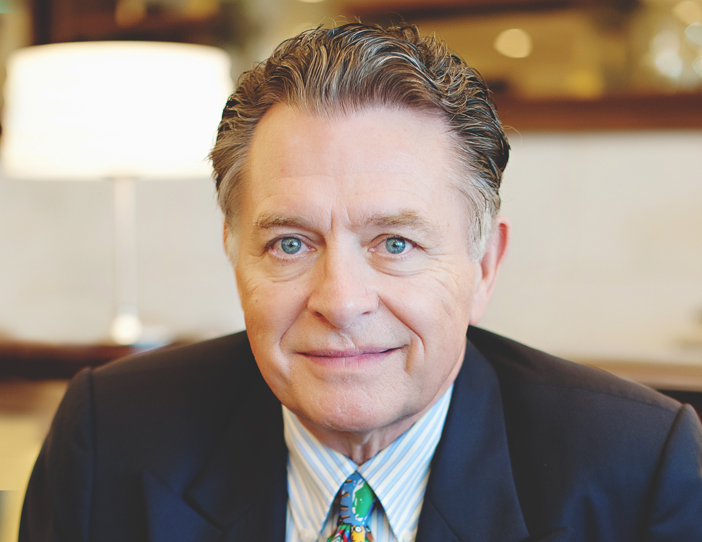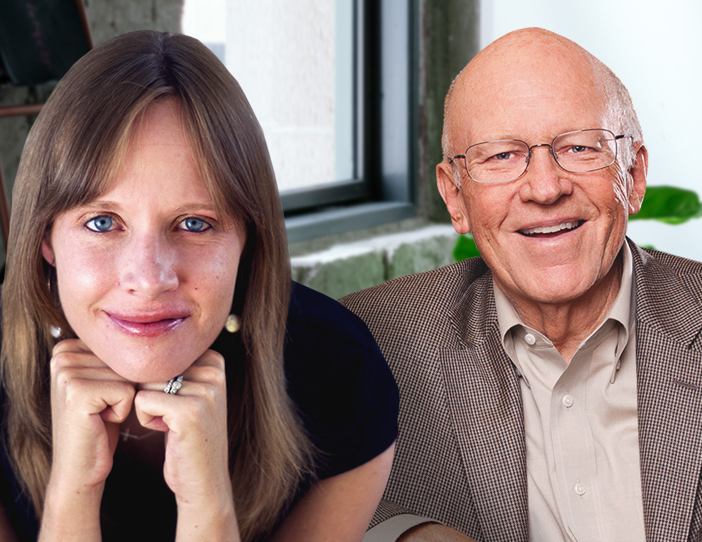
Episode Description
If you want to grow your business, of course you’ve got to get the everyday stuff right: product quality, customer satisfaction, marketing, personnel, logistics, etc.
But there’s more to success than those elements. To see the right kind of growth in our business, we also need to focus on our personal growth.
That’s why this week’s episode is designed to give you a moment of reflection this summer. In our second of two podcasts featuring the Best of 2017 (So Far), we’ve compiled the most powerful advice from our podcast guests for staying balanced and healthy while your business grows.
(If you missed it, Part 1 is here.)
Part 2 is another great treasury of selected hits to help you move forward at work while staying balanced:
- Lee Cockerell knows what people LOVE in a leader. As a former EVP at Disney, he reminds us that the people who work in our company are what really make up our brand.
- Chalene Johnson advises us to envision what success looks like before we start scaling up our business. This one may save you an eventual heartache, and may even save your marriage!
- Stephen Mansfield describes a warning sign that indicates business leaders are in danger of a disastrous downfall. Want to prevent your own demise? Listen to this.
- Ian Cron encourages us to develop self-awareness by learning about our personality with an ancient personality typology called the Enneagram. Which of the nine personality types are you?
- Claire Diaz-Ortiz and Ken Blanchard reveal a new model of mentoring where wisdom flows in both directions. Have you found your mentor yet? It might be the key to your success!
You can read the summary of the interview segments below. Or just relax and listen to this week’s episode.
#1: Your People Are Your Brand
Lee Cockerell, former EVP of Operations at Disney, led a team of 40,000 cast members
Something they don’t teach much at business school are soft skills — how to work well with other people.
Lee says this is a problem. Leaders usually get in trouble because of how they treat people, not because they don’t know what they’re doing.
As managers, we usually have a certain skill-set like being organized and disciplined. These traits are needed for getting tasks done. But those very qualities that helped us rise to the top might intimidate our team members.
When we’re in a position of power, the people we work with tend to read our behavior through a filter of disapproval. They read organization as being preoccupied or discipline as overlooking people.
If we’re not careful, we can hurt the very people we depend on to make our business run well.
Lee got his wake up call when he arrived for a meeting with one of his managers and found him in the hospital. The director expected Lee to criticize him and the stress of the meeting was too much. It caused him to have an anxiety attack.
Lee realized he was viewing his role as a leader in the wrong way. He began to make changes, attending trainings and reading books that would help him work well with the people he supervised. Over time, he changed his reputation from a tough supervisor to an encouraging teacher.
“Too many people out there want to be bosses instead of teachers.”
“Too many people out there want to be bosses instead of teachers,” Lee says.
“When you start to think about teaching people and helping them get ahead, you get ahead too.”
He points out that if we select and train our people well, we’re going to have a great business. But we need to have a teaching heart rather than an arrogant or preoccupied attitude.
“We’ve got to understand the value of people because, at the end of the day, your people are your brand,” he says.
[LISTEN TO EPISODE #38 ON iTUNES]
#2: Scale Up Your Business with “Enough” in Mind
Chalene Johnson, entrepreneur and New York Times bestselling author
Chalene knows how to be successful. She and her husband, Bret, have started and sold multiple multi-million dollar lifestyle companies and helped many others follow in their footsteps.
While she can guide you in scaling up your business, she’ll differ from all the other advice on success with a word of caution: Be careful what you wish for.
Chalene speaks from experience. She and Bret came to a point in their lives when they had a lot of money in the bank but “no room to breathe.” Both were trudging along, tired of their daily lives. Success wasn’t delivering what they wanted.
“Success can kind of sneak up on you and somehow steal your happiness. You don’t even realize it – like weight gain. All of a sudden, you look in the mirror and can’t recognize yourself.”
“Success can kind of sneak up on you and somehow steal your happiness. It can go too far. You don’t even realize it — like weight gain,” Chalene says. “All of a sudden, you look in the mirror and can’t recognize yourself.”
She and Bret took some time to reassess their lives. They defined what they wanted and scaled down many of their activities until they found the right fit for both of them.
Before you scale up your business, Chalene suggests defining what success looks like to you. What is enough? In scaling up, there can come a point when you have too much, are responsible for too many people, and are working too many hours.
We’re all high achievers — we know how to master and accomplish tasks. But we need to think before we go after things that don’t lead us to a purposeful life, she points out.
Chalene tells us to decide what’s really important to us before we start checking off our to-do list. Otherwise, success might come and take us to places we never wanted to go.
[LISTEN TO EPISODE #29 ON iTUNES]
#3: Know When You’re Out of Season
Stephen Mansfield, author of Ten Signs of a Leadership Crash
A leadership crash is one of the most devastating events that can happen to a company.
The mistake of one person — an affair, misspent money, or a violation of privileges — can cause many people to suffer because of job losses. Corporate America sacrifices billions of dollars each year to a leader’s mistake or spiraling out.
This can be prevented, Stephen says. After years of helping organizations and leaders recover from destructive leadership crashes, Stephen and members of the Mansfield Group noticed common symptoms that are usually present in a leader’s life before a collapse occurs.
By knowing these common signs of an impending leadership crash, you can either catch yourself or intervene on a leader’s behalf.
Some of these red flags you can probably guess. But some of them are completely surprising and need some explanation to understand. Stephen calls the very first sign “a bit mystical” because it’s a common trait that can look very different to individual leaders.
He calls it being “out of season.”
We know we’re out of season when we’ve begun a descent from which there is no recovery
We know we’re out of season when we’ve begun a descent from which there is no recovery, Stephen says. We’re not where we’re supposed to be. We promised we’d leave after so many years and that time has passed. There’s no mojo. All the people around you can easily see you’re not in a good place.
“That’s when you’re vulnerable. That’s when you’re off-balance,” Stephen says. The next move is often the beginning of the end.
Evaluate your life right now. Are you out of season?
If so, Stephen has a suggestion for you: Bring it to a close. If you continue pushing through this phase, you’ll be tempted to fix things by turning to something that could make matters worse. Acknowledge to others that you are out of season. Talk to your spouse or the people who advise you.
Then, stop.
[LISTEN TO EPISODE #34 ON iTUNES]
#4: Develop Self-Awareness by Learning Your Enneagram Type
Ian Cron, author of The Road Back To You
Learning your personality type may not be your first priority in business, but it should be.
Ian sites a study from Cornell of 72 CEOs of companies from $50 million to $5 billion in yearly revenue. The research found that the key predictor for success of leaders is self-awareness.
What is self-awareness?
Ian defines it as, “The capacity to monitor and self-regulate your internal world in real time.”
Most of us live in a state of reactivity. We strike out when something triggers us and we end up worsening the problem.
With self-awareness, we are free to behave differently.
Understanding yourself means you can make different choices than the ones you make when you’re on “automatic self,” he points out.
How do you develop self-awareness?
Ian suggests starting with the Enneagram, an ancient model of personality typology. It teaches that there are nine core basic personality types in the world, one of which you, in childhood, gravitate toward as a way of navigating the world.
We all have a temperament. But over that, we develop our personalities — traits and ways of being in the world that help us meet cultural expectations and get our needs met.
“Personality is really good. The purpose of the Enneagram is not to delete your personality and start over,” Ian says. “It’s meant to help you identify those aspects of your personality that aren’t working for you anymore as an adult, even though it helped you get through childhood. By understanding your personality and how you came to be who you are today, you’ll develop that all-important quality of self-awareness.”
[LISTEN TO EPISODE #42 ON iTUNES]
#5: Try the Two-Way Model of Mentoring
Ken Blanchard and Claire Diaz-Ortiz, authors of One Minute Mentoring
Things turned out differently than she expected when Claire Diaz-Ortiz, an author and speaker, met up with Ken Blanchard, the iconic leadership consultant, to write a book on mentoring.
Claire imagined she would write down all the great things Ken said in her Moleskine journal, go home at night and review all his words of wisdom, and try to memorize them.
That makes sense. Mentoring has traditionally consisted of an older, more experienced person passing down wisdom to the younger. Since Ken co-authored the One Minute Manager and forever changed the way we think about management, I’d feel the same way as Claire and have my pen ready.
But as Claire and Ken began discussing their past experiences in mentoring, they both had to admit they had taught their mentors a thing or two. Ken says they both had an ‘aha’ experience when they noticed this trend. This prompted them to explore developing a model of two-way mentoring.
Which relationships are good candidates for two-way mentoring?
The first step is finding out whether you and your mentoring partner have essence, which could also be termed “chemistry.”
Ken suggests the first step is finding out whether you and your mentoring partner have essence, which could also be termed “chemistry.” He defines it as “heart to heart and values to values.”
It’s important to establish essence in that first meeting before launching into a two-way mentoring relationship because those uncoded connections pave the way for the second part of mentoring.
The second part of mentoring is called form, or “What are we going to do?”
While this is also very important, trying to do two-way mentoring without essence will only be frustrating to both members.
Claire points out that perhaps the most important trait, especially from the more experienced member of the mentoring relationship, is humility.
“It’s only going to work if both people come to it basically humble,” she explains.
Discovering that an established thought-leader like Ken could learn from an upcoming author and speaker like herself inspired Claire.
“It was an amazing, very empowering, experience for me, and it’s completely transformed what I think of positive, powerful mentoring,” she says.
[LISTEN TO EPISODE #50 ON iTUNES]
—
If there’s a common thread from all our guests, it’s this: You can transform your business by transforming yourself. The summer is a great time for a little self-evaluation. Ask yourself some of these questions or take these action steps:
- If your people are your brand, are you building trust by being a teacher or losing trust by being a boss?
- How much success is too much? Spend time on defining this before scaling up your business.
- Are you “out of season” anywhere in your life? If so, what steps do you need to take to stop pushing?
- Discover your personality type and find out how you can avoid running on “automatic self.”
- Set up a meeting with someone who might be a good mentoring partner. Discover whether you have essence. If so, follow it up with another meeting to lay out the form.
Which of these resonates with you? Leave me a comment and let me know.

Got a Good Product with Bad Sales?
If so, chances are your messaging needs work. We can fix it together. Come to one of our Live Workshops this summer and I’ll walk you through it. We’ve got sessions in both Nashville, TN and Portland, OR. Which one works for you?
Executive producer: Tim Schurrer
Additional production and editing: Chad Snavely









